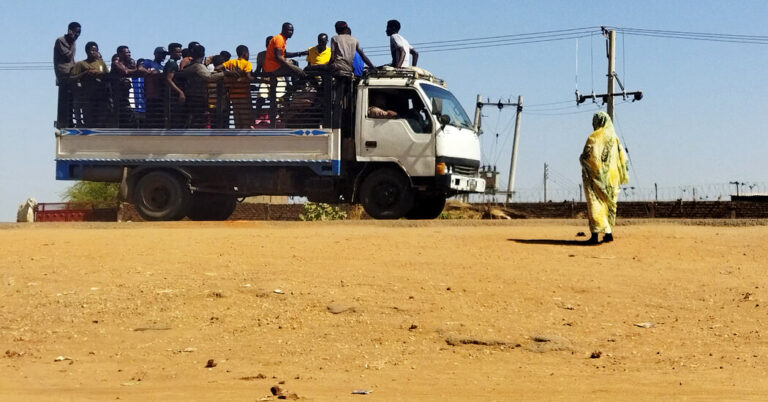Fighting in Sudan has spread to the outskirts of a major city that is a refuge for displaced people and a center for aid groups, threatening to open another deadly front in an eight-month war that has devastated Africa’s third-largest nation.
The Sudanese Army and the rival paramilitary Rapid Support Forces have been clashing on the edges of Wad Madani, a city about 100 miles southeast of the capital, Khartoum, that tens of thousands of people fled to after the war began in April.
On Saturday morning, residents said that army aircraft could be heard flying over the city, with at least one neighborhood nearby coming under aerial bombardment. Many shops and businesses were shut down, and some residents were piling their belongings onto buses and rickshaws as they prepared to leave the city.
“People are really afraid,” said Faiz Mohamed, who fled Khartoum and said he was now leaving for Port Sudan, a city on the Red Sea.
The paramilitary Rapid Support Forces have solidified their control over the Darfur region in the west in recent months — even as those gains came at the cost of brutal ethnic violence.
On Friday, heavy gunfire could be heard in several parts of Wad Madani’s suburbs, with fighting occurring in fits and starts throughout the afternoon, according to witnesses and aid workers. At least two people were killed in the violence, and several others were injured, according to local civilian groups known as the resistance committees.
After those clashes, the governor of El Gezira State, an important breadbasket of which Wad Madani is the capital, announced a 6 p.m. to 6 a.m. curfew, Sudan News Agency reported. The United Nations said that all humanitarian field missions in the state were suspended until further notice.
Linda Thomas-Greenfield, the United States ambassador to the United Nations, said on Saturday that she was “gravely concerned” by the reports of the paramilitary’s group attack on the city. “I urge the RSF to refrain from attacks and for all parties to protect civilians at all costs,” she said in a statement on social media.
The fighting could herald a new front line in the war that has engulfed Sudan since April 15, when rival military factions began clashing over who will dominate the future of the northeast African nation.
Over 10,000 people have been reported killed and thousands more injured, and experts believe that the true fatalities are much higher. Nearly 18 million of the country’s 46 million people are facing acute hunger, according to the United Nations, and almost seven million people have been displaced in the conflict.
Peace efforts, backed by the United States and several East African nations, have been unsuccessful, with both sides maintaining that they are capable of outright victory.
Since April 15, nearly 500,000 people have fled to Wad Madani and the wider Gezira State, many of them arriving from Khartoum and the adjoining cities of Bahri and Omdurman. As the influx overwhelmed local services and pushed up the prices of food, fuel and housing, dozens of local and international aid agencies also moved their staff and quickly began operations there.
Now, observers say, the city faces the prospect of war.
The paramilitary Rapid Support Forces said in a statement on Friday that it aimed to “eradicate” the army and that it was “committed to safeguarding the security and welfare” of the state and city’s residents.
In early December, Secretary of State Antony J. Blinken determined that both warring parties had committed war crimes. He also accused the paramilitary forces and its allies of committing ethnic cleansing and crimes against humanity.
And in Wad Madani, residents said they felt anything but safe amid the latest developments. Humanitarian agencies are scrambling to get food and water to thousands of people fleeing the violence and arriving in neighboring Sennar State.
With funding shortages and possible cutoffs in supplies, aid workers say it will be hard to stretch their meager resources to support so many people who are now being doubly displaced.
“Aid operations are further jeopardized, though we need to stay and deliver as much as possible,” said Will Carter, the Sudan director of the Norwegian Refugee Council, which has 28 staff members in Wad Madani. “People fled to these sanctuary cities to get assistance, and now they face a terrible future.”



